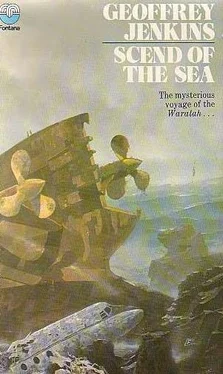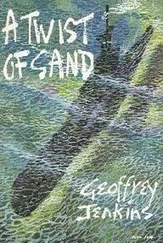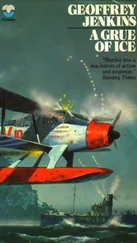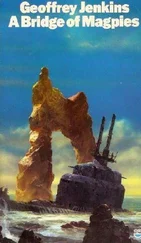Geoffrey Jenkins - Scend of the Sea
Здесь есть возможность читать онлайн «Geoffrey Jenkins - Scend of the Sea» весь текст электронной книги совершенно бесплатно (целиком полную версию без сокращений). В некоторых случаях можно слушать аудио, скачать через торрент в формате fb2 и присутствует краткое содержание. Жанр: Морские приключения, на английском языке. Описание произведения, (предисловие) а так же отзывы посетителей доступны на портале библиотеки ЛибКат.
- Название:Scend of the Sea
- Автор:
- Жанр:
- Год:неизвестен
- ISBN:нет данных
- Рейтинг книги:5 / 5. Голосов: 1
-
Избранное:Добавить в избранное
- Отзывы:
-
Ваша оценка:
- 100
- 1
- 2
- 3
- 4
- 5
Scend of the Sea: краткое содержание, описание и аннотация
Предлагаем к чтению аннотацию, описание, краткое содержание или предисловие (зависит от того, что написал сам автор книги «Scend of the Sea»). Если вы не нашли необходимую информацию о книге — напишите в комментариях, мы постараемся отыскать её.
Scend of the Sea — читать онлайн бесплатно полную книгу (весь текст) целиком
Ниже представлен текст книги, разбитый по страницам. Система сохранения места последней прочитанной страницы, позволяет с удобством читать онлайн бесплатно книгу «Scend of the Sea», без необходимости каждый раз заново искать на чём Вы остановились. Поставьте закладку, и сможете в любой момент перейти на страницу, на которой закончили чтение.
Интервал:
Закладка:
It was not so much upon the ships that I concentrated now. I had taken to the Southern Ocean with me in Walvis Bay volume after volume of weather statistics dating back to the beginning of the records, which was after the Waratah had vanished. I resuscitated from oblivion every winter storm of consequence for half a century. They, too, were set off in graphic form 'on my chart, and each had its own separate colour.
Of the storms in which the Waratah had disappeared there were only limited meteorological records. Yet I had painstakingly gathered information from the logs of as many ships in Cape waters at the time of the disaster as I could still obtain. I had also unearthed a copy of the official Board of Trade inquiry into the loss of the Waratah, and from micro-film records I had the day-to-day newspaper reports of witnesses at the hearing.
The inquiry itself had been singularly barren of specific information on the storm; it had concluded vaguely that it had been one ‘of exceptional violence’.
It was small wonder when Tafline came to my cabin that she should marvel that a man could spend months at sea with his only apparent companions some sterile books on meteorology; in actuality, the sifting and correlating of this huge burden of obscure, forgotten, time-sunk data had passed away my months on the weather station only too quickly. How could I explain this when she saw my Waratah chart with its 'lines and figures'; how could I explain it all to a girl whose name I then did not even know?
Dominating all the other storms was the one in which the Waratah had vanished; I outlined it in black.
Now, because of what was happening up on deck, that black-circled storm was being wrenched out of the sphere of academic doldrum to find expression in the wild waters and insane wind which would surely come. How much could I deduce from it? The official forecast I had heard earlier had spoken of a south-westerly gale off the southern Cape coast, but in winter one can count on four or five of them a month. There was no hint of anything exceptional in this one-yet.
I held myself back deliberately for a moment on the threshold of plunging into deductions from that funeral-lettered Waratah storm. She had known none of this when she had stood by the cabinet where I had carefully stowed away all my facts about the Waratah — statistics, photostats, microfilms, comments, legend, a model of the ship even. Yet with some curious perception she had gone to my photograph of the Waratah. Why? Forces? Ultra-sensitivity to the pent-up transmissions of my own mind? She had called it grief, mistakenly, but still she had been aware of something pressing. .
About a year before, when searching ashore for Waratah information, I had come across a folded sheet of notepaper in an archive. It was a lover's note, written that last sailing day from the Waratah. The very sheet of notepaper came from the ornate lounge of the Waratah itself. As I opened the note, my awareness of what I have come to call 'forces' was overwhelming. I knew what that workaday shipmaster meant when he said the Waratah had no soul. The note was signed with endearments, 'for ever and ever'. There were no proper names. What pair of lovers, I asked myself, had the Waratah separated, 'for ever and ever'? That old captain had seen the Waratah herself, not merely a sheet of notepaper, to reinforce the sort of imponderable emotions I felt at the sight and touch of the note. So strange had been his feelings that he had called his quartermaster and asked him what he thought of the Waratah. Quartermasters, especially those of half a century ago, were a breed of men not given greatly to flights of fancy. They had come up in the hard school of sail; they were tough; the sea was their life.
Looking at the pride of the Blue Anchor Line, the quartermaster replied quickly and simply, ‘I wouldn't sail in her for ten times my pay.'
Smit knocked at the door with three radio signals. He came in, glancing inquisitively at my chart. As a yachtsman, he had that indefinable feeling for sea and weather which the plain man of steam lacks.
'In for a blow, sir?'
My assessment would depend on the signals he brought. If they fitted the template of Waratah weather which lay plotted in front of me…
I shrugged before I read them.
Smit said, 'I was round this way once in early winter, and it was bad enough then, especially in a small boat. I thought my last moment had come at the sight of some of those seas.'
'It's a question of what happens to an ordinary-looking gale once it rounds the ankle of the coast,' I said. I grinned as he peeped shyly at the lines and whorls of my old storm fronts.
'Doesn't seem to be any very unusual yet,’ he replied. 'Gale warning, Force 8-40 knots.'
I knew exactly what it all looked like-on paper. I had been through it all a hundred times. But it was the clincher, those unread, apocalyptic messages Smit had brought and which I played with, which would provide the key, the dovetailing pattern, if it existed: I had sailed from Durban on what was a typical, mild winter's evening (warm enough to swim in the afternoon), no threat on the barometer, and scarcely a wind or sea worth speaking about So had Waratah. I had resurrected from oblivion the port captain's weather report of July 26th, 1909.
5 p.m. barometer 28.860; thermometer 74; light north-east wind; harbour entrance, smooth; light north-easterly sea.
My own log read:
5 p.m. barometer 28.862; thermometer 73; light north-east wind; harbour entrance, smooth; light north-easterly sea.
Nothing could be more identical.
From the mustiness of old records I had found the log of the lighthouse-keeper of Cape Hermes telling of the weather that last fateful morning when, in sight of his light off Port St John's, Waratah and Clan Macintyre had exchanged their last signals. 'Hazy but fine,' the keeper had reported.
A little while before Walvis Bay had steamed slowly past Cape Hermes. 'Hazy but fine,' I had logged.
Before coming below, I had requested from East London, Port Elizabeth and Cape St Francis, the projecting 'ankle' of coast near Port Elizabeth, their sea and weather conditions that morning. These were what Smit had given me.
I would have liked to have shared with Smit the secrets of my heavily-scored chart, but there was too much at stake.
'I’ll join you on the bridge in a few minutes,' I told him. He looked disappointed and a little surprised that I had not yet read the radio signals.
Of the weather the day before the Waratah had vanished, I had annotated the chart:
Port Elizabeth — light westerly wind, smooth sea. I unfolded my radio signal. It said:
Port Elizabeth — light westerly wind, smooth sea. I ran my finger down to the crucial Cape St Francis.
Cape St Francis — gentle north-east wind, smooth sea. My signal read:
Cape St Francis — gentle north-east wind, smooth sea. Last was East London, nearest port to where the Waratah disappeared:
East London — gentle westerly wind, smooth sea. There was scarcely any need for me to read the third radio signal:
East London — gentle westerly wind, smooth sea. That was Waratah weather coming up from the south-west to meet Walvis Bay.
I knew what I had to do.
I went quickly on to the bridge. The sky to the south-west was a diseased cobalt. The sea had a peculiar sheen, like a 'wet look' shoe.
'Course, south-west, true,' I ordered Smit. I rang the engine-room telegraph. 'Revolutions for thirteen knots.'
Waratah had been twelve miles offshore in her last fateful hours; I would hold Walvis Bay twelve miles likewise; Waratah had been afloat at this point, and she had passed Clan Macintyre at thirteen knots, overhauling her and crossing her bows from the starboard, or landward, side. I would hold Waratah's course from now until. . until… I paused. Only the Waratah gale could tell me that.
Читать дальшеИнтервал:
Закладка:
Похожие книги на «Scend of the Sea»
Представляем Вашему вниманию похожие книги на «Scend of the Sea» списком для выбора. Мы отобрали схожую по названию и смыслу литературу в надежде предоставить читателям больше вариантов отыскать новые, интересные, ещё непрочитанные произведения.
Обсуждение, отзывы о книге «Scend of the Sea» и просто собственные мнения читателей. Оставьте ваши комментарии, напишите, что Вы думаете о произведении, его смысле или главных героях. Укажите что конкретно понравилось, а что нет, и почему Вы так считаете.












